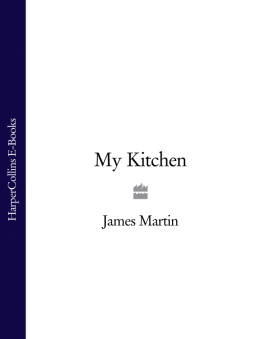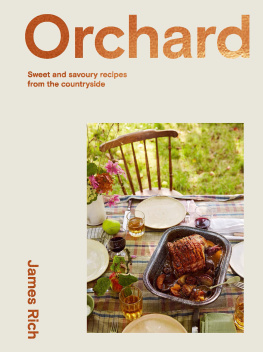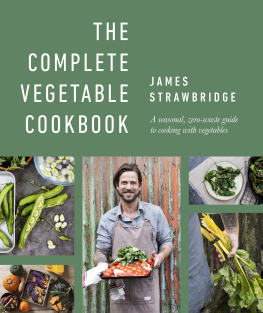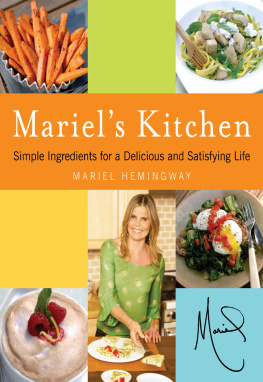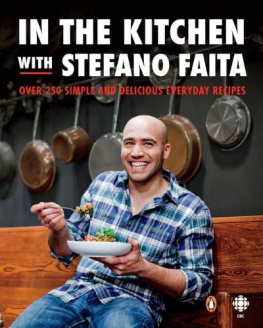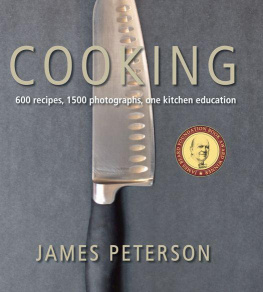Its all in a season. Thats what my granddad used to say to me. A keen gardener, he would to take me to his allotment and greenhouse whenever I went to visit. That was my first real insight into fresh food and where it comes from before that it had just been microwaved jacket potatoes or steak with onion rings from a Berni Inn. So, Im sure it was there right there aged five, that the seeds were planted in my mind, and I knew I was going to be a cook.
Many people in the UK grow up in urban areas with little or no awareness of where their food comes from and when it is actually in season. In my opinion, this is mainly down to the supermarkets offering the same food week-in, week-out.
But the seasons are the planets natural cycle and they exist for a reason, so it makes no sense to try and beat them. Think of each changing season as out with the old and in with the new, welcome the next lot of produce and dont go searching for out-of-season food. There are so many good reasons to eat what we produce locally, the obvious ones being to support the British farmers, to reduce CO2 emissions from transport, and above all else to get the best possible taste. You only have to try Jersey Royals or British strawberries to understand what I mean.
In a country obsessed with cheaper and cheaper food, we should take a step back and re-assess. If we want great food on our plates we have to be willing to pay for it. Im not saying it has to be expensive were still talking pence, not pounds and, in fact, food is at its cheapest when in season even luxury foods like asparagus.
Things are already changing for the better, with people learning more about food from books and TV programmes and paying closer attention to what they are eating. But more can still be done. We just need to get out of the habit of expecting what we want whenever we want it. It has always been my mission to champion the food thats on our doorstep, and this is exactly the food I cook at home, in my own kitchen.
Those who have their own garden or allotment will always have access to the utmost in fresh produce. They will also know that its a great teaching tool for young and old alike, and that growing your own food can be a source of much satisfaction. Most importantly, if we eat seasonal food it will be at its cheapest because of its abundance, and the flavour will be at its best.
This book is all about celebrating this island of ours, and the food that grows on it, and the best way I can get you excited about cooking this way in your own home is to give you the recipes I cook in my own throughout the year.
Enjoy,
James
Radishes Asparagus Spring onions Leeks Jerusalem artichokes Spinach Elderflowers Rhubarb Parsley Lamb Sea bass Salmon Spring brings a garden to life with the promise of delicious crops to come. In Britain we can enjoy seasonal produce such as wild garlic, Jerusalem artichokes and watercress. Radishes and spring onions push up through the soil and elderflowers fill the hedgerows. Sea bass and salmon are a real treat for seafood lovers, while for meat eaters the end of the season brings with it succulent spring lamb. And I wouldnt be a true Yorkshireman if I didnt mention the best bit of all rhubarb! Harvest from the garden or enjoy the tender pink forced variety, still available at this time of year.
Serves 4Vegetarian4 large floury potatoes, peeled and quarteredbunch of spring onions, finely chopped2 tbsp chopped chives110g (4oz) flour, for dusting150ml (5fl oz) olive oil110g (4oz) butter4 duck eggs200g (7oz) watercress50ml (2fl oz) extra-virgin olive oil20ml (fl oz) white wine vinegarSalt and black pepperPotato cakes are excellent as a starter or as a filling snack.
They can be prepared in advance and kept in the fridge until needed. Duck eggs are a Saturday Kitchen favourite. Cook them just like hens eggs; however, theyre too rich to use in baking.
Place the potatoes in a large saucepan, cover with water and add a good pinch of salt. Bring to the boil and cook for 2025 minutes, then drain and return to the pan. With the pan on a heatproof surface, mash the potatoes well, then transfer to a large bowl and season with salt and pepper. Mix in the spring onions and chives and divide the mixture into eight balls.
Lightly dust a work surface with flour, place a potato ball on it and shape into a round, flat cake about 1cm (in) thick and 5cm (2in) wide.
Repeat with the rest of the potato and place the finished cakes in the fridge for about an hour to firm up.
Add the olive oil to a non-stick frying pan, dust the potato cakes with flour and fry over a medium heat for 34 minutes on each side. Depending on the size of the pan, you may have to cook them in batches.
While the potato cakes are cooking, melt the butter in another non-stick frying pan, set over a medium heat, and once it is hot and bubbling, crack the duck eggs into the pan and cook them until the edges are crispy but the centres remain soft.
Dress the watercress with the extra-virgin olive oil and the vinegar and season with salt and pepper, to your taste. Place 12 potato cakes on each plate, top with a fried egg, drizzle with the leftover butter from the egg pan and serve with some watercress on the side. 
Serves 4300g (11oz) Jerusalem artichokes1 large shallot1 small potato4 tbsp extra-virgin olive oil1 clove of garlic, peeled and crushed500ml (18fl oz) Vegetable Stock (see page 218)3 rashers of smoked streaky bacon110ml (4fl oz) double creamSalt and black pepperCrusty bread, to serveJerusalem artichokes are the roots of a plant related to the sunflower. They come into season very early in spring, sometimes even earlier, at the tail end of winter. Despite having the same name, the globe artichoke comes from a completely different plant and isnt in season until the summer.
Jerusalem artichokes make excellent soup; I also love them in pures, salads or simply sauted.
Peel the artichokes, shallot and potato and chop into 1cm (in) cubes. Set a large, heavy-based saucepan over a medium heat and add 2 tablespoons of olive oil. Tip in the vegetables and fry gently for 23 minutes, without browning.
Add the garlic and pour in the vegetable stock. Bring to the boil and cook for 810 minutes or until the artichokes and potato are cooked through and soft.
Meanwhile, heat the grill to high and grill the bacon on both sides until crispy, then set aside. Once cool, cut into pieces.
Add the cream to the soup, bring back up to the boil and cook for another 23 minutes. Remove the pan from the heat, then pour the soup into a blender and puree until smooth.
Alternatively, puree the soup using a held-held blender.
Return the soup to the pan, reheat gently and add salt and pepper, to taste. Pour the soup into bowls and sprinkle with small pieces of the bacon. Drizzle with the remaining olive oil and serve with fresh crusty bread.
Serves 4Vegetarian3 orangeshead frise lettuce4 radishes, slicedbunch of chives, in 2.5cm (1in) lengths1 tbsp white wine vinegar5 tbsp extra-virgin olive oilSalt and black pepperThis refreshing salad makes a great accompaniment to fish, especially smoked salmon. The outer leaves of frisee lettuce can be bitter, so use the inner leaves only. Zest two oranges, then peel and break the segments into a large bowl. Add the lettuce leaves, radish slices and chives.

